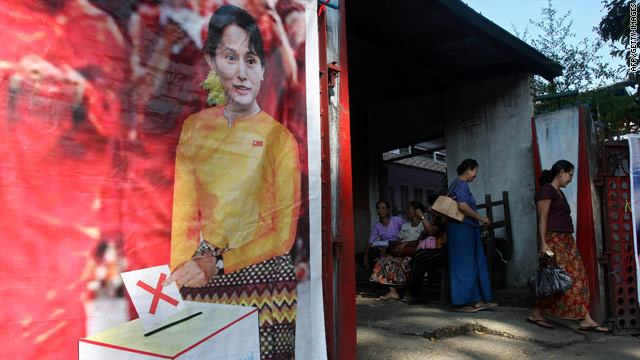Scammer
Banned

People walk into the National League for Democracy (NLD) office past portraits of Aung San Suu Kyi in Yangon on Nov 4, 2010
Speculation abounds as Saturday nears -- the day when Nobel Peace laureate Aung San Suu Kyi's house arrest is to end in Myanmar.
"If they release her, it's not because her term is up. They can always come up with excuses to detain her," said Maung Zarni, a research fellow on Myanmar at the London School of Economics.
Suu Kyi's younger son, Kim Aris, applied for the visa in Thailand on Monday. The application is pending, the Myanmar Embassy said on Thursday.
Security has been stepped up in Myanmar, but it was unclear whether that was because of Suu Kyi's possible release or because of the country's first elections in two decades, which happened Sunday.
The ruling military junta has not released official election results, but critics say a military victory is all but certain. They called the elections a fraud aimed at creating the facade of democracy in Myanmar, which also is known as Burma.
"There is much speculation about whether or not Aung San Suu Kyi will be released," the Burma Campaign UK said. "The recent hard line taken by Burma's generals towards human rights, and blatant rigging of the 7th November election, could indicate that it is unlikely they will release her. Conversely, they could be calculating that by releasing Aung San Suu Kyi they will receive so much positive publicity it will counter the negative attention on the election."
If Suu Kyi is released on Saturday, one of the first things she'll do is challenge the legitimacy of the elections, Zarni said. She'll also meet with leaders of her political party and challenge the legitimacy of Myanmar's recently overhauled constitution, which the military regime redrafted to tighten its grip on the country, Zarni added.
Her release would have to be approved by Sr. Gen. Than Shwe, Zarni said. As it is, Suu Kyi has been held under house arrest at his discretion, Zarni said.
The political activist has made demands as well.
"She has made it categorically clear that she will not accept conditions; that she will not walk out of the house with conditions," Zarni said.
Such limitations could include restrictions on where she could go, on whom she could meet with, and on how she could communicate. For instance, she wants a Twitter account so she can communicate with Myanmar's younger population, Zarni said.
Suu Kyi's lawyers are skeptical about her possible release.
"The regime has repeatedly claimed it intended to release her on various dates over the years and has then failed to follow through on its commitment to release her. So, ultimately, I don't tend to follow what they say, but rather what they do," said her attorney Jared Genser, who is based in Washington.
The political activist has spent most of the past 20 years under house arrest. Suu Kyi won the Nobel Peace Prize in 1991.
Her National League for Democracy party won a landslide election victory in Myanmar in 1990, but the military junta rejected the results.
The regime recently passed a law that made her ineligible to stand in Sunday's elections because of her court conviction. Her supporters have said that her current conviction was a way to remove her from the election campaign.
A Myanmar court convicted Suu Kyi in August 2009 for breaching the terms of her house arrest after American John Yettaw swam uninvited to her lakeside house in Yangon and briefly stayed there.
On Thursday, Myanmar's Supreme Court rejected Suu Kyi's appeal for release, her lawyer Nyan Win said. It was her last chance to appeal, but the loss was expected. She lost a similar appeal in a lower court in February.
Before Sunday's elections, U.N. Secretary-General Ban Ki-moon urged Myanmar's junta to release Suu Kyi and all other political prisoners so that the voting was legitimate.
Myanmar, which has been under military rule since 1962, is holding an estimated 2,000 political prisoners.
